Mount Smuts
Mount Smuts is a 2,938-metre (9,639-foot) mountain summit located in the Spray Valley, near the northern end of the Spray Mountains range. It is situated on the shared boundary of Peter Lougheed Provincial Park with Banff National Park in the Canadian Rockies of Alberta, Canada. Mount Smuts in not visible from any road in Banff Park, however, it can be seen from Alberta Highway 742, also known as Smith-Dorrien/Spray Trail in Kananaskis Country. Mount Smuts' nearest higher peak is Mount Birdwood, 2.8 km (1.7 mi) to the south-southeast.[1]
| Mount Smuts | |
|---|---|
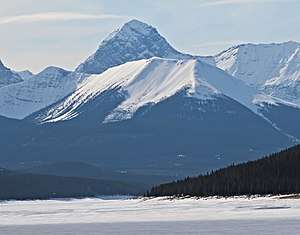 Mount Smuts above Tent Ridge | |
| Highest point | |
| Elevation | 2,938 m (9,639 ft) [1] |
| Prominence | 591 m (1,939 ft) [1] |
| Parent peak | Mount Birdwood (3097 m)[1] |
| Listing | Mountains of Alberta |
| Coordinates | 50°48′28″N 115°23′13″W [2] |
| Geography | |
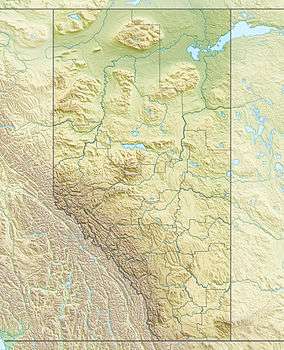 Mount Smuts Location of Mount Smuts in Alberta 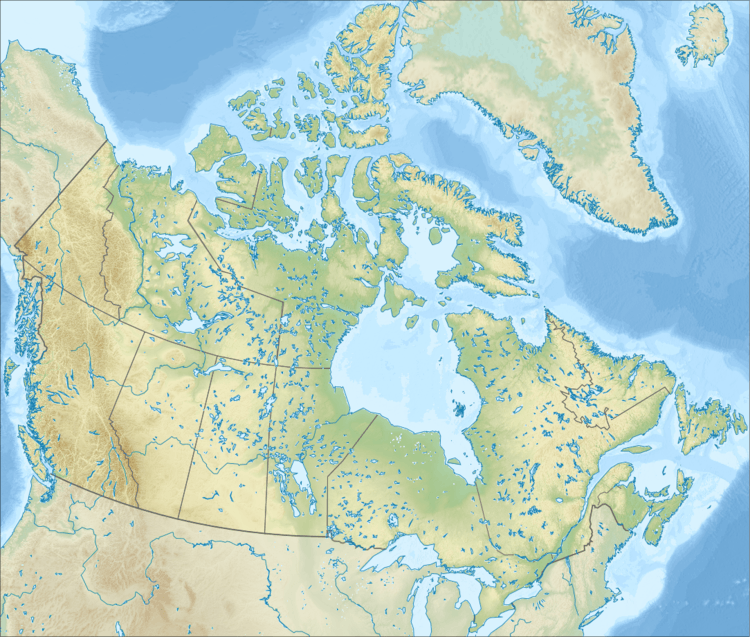 Mount Smuts Mount Smuts (Canada) | |
| Location | Alberta, Canada |
| Parent range | Spray Mountains Canadian Rockies |
| Topo map | NTS 82J/14[2] |
| Geology | |
| Age of rock | Cambrian |
| Type of rock | Limestone |
| Climbing | |
| First ascent | 1926 M. Crosby, M. Kennard, H.S. Crosby, C.A. Willard, Rudolph Aemmer[1] |
| Easiest route | Scrambling[3] |
History
Mount Smuts was named by the Interprovincial Boundary Commission in 1918 for General Jan Smuts (1870–1950), a noted South African statesman and mountaineer.[4] During World War I, he led the armies of South Africa against Germany, capturing German South-West Africa and commanding the British Army in East Africa in 1916-1917.[5][6]
The mountain's name was officially adopted in 1924 by the Geographical Names Board of Canada.[2]
The first ascent of the peak was made in 1926 by M. Crosby, M. Kennard, H.S. Crosby, C.A. Willard, with guide Rudolph Aemmer.[6]
Geology
Mount Smuts is composed of sedimentary rock laid down during the Precambrian to Jurassic periods.[7] Formed in shallow seas, this sedimentary rock was pushed east and over the top of younger rock during the Laramide orogeny.[8]
Climate
Based on the Köppen climate classification, Mount Smuts is located in a subarctic climate with cold, snowy winters, and mild summers.[9] Temperatures can drop below −20 °C with wind chill factors below −30 °C. In terms of favorable weather, July through September are the best months to climb. Precipitation runoff from the mountain drains west into Spray River, or east to Smuts Creek, both of which empty into Spray Lakes Reservoir.
Climbing
Mount Smuts is a difficult and exposed scramble on limestone slabs via the south ridge and very few parties successfully summit each year.[3] Rope is recommended for anything less than ideal conditions.
See also
- Geography of Alberta
- List of peaks on the British Columbia-Alberta border
- Canadian Rockies
References
- "Mount Smuts". Bivouac.com. Retrieved 2018-12-31.
- "Mount Shark". Geographical Names Data Base. Natural Resources Canada. Retrieved 2018-12-31.
- Alan Kane (1999). "Mount Smuts". Scrambles in the Canadian Rockies. Rocky Mountain Books. p. 128. ISBN 0-921102-67-4.
- Imperial ecology: environmental order in the British Empire, 1895–1945, Peder Anker Publisher: Harvard University Press, 2001 ISBN 0-674-00595-3
- Place-names of Alberta. Ottawa: Geographic Board of Canada. 1928. p. 117.
- "Mount Smuts". PeakFinder.com. Retrieved 2019-10-08.
- Belyea, Helen R. (1960). The Story of the Mountains in Banff National Park (PDF). parkscanadahistory.com (Report). Ottawa: Geological Survey of Canada. Archived (PDF) from the original on 2015-10-02. Retrieved 2019-09-13.
- Gadd, Ben (2008). Geology of the Rocky Mountains and Columbias.
- Peel, M. C.; Finlayson, B. L. & McMahon, T. A. (2007). "Updated world map of the Köppen−Geiger climate classification". Hydrol. Earth Syst. Sci. 11: 1633–1644. ISSN 1027-5606.
Gallery
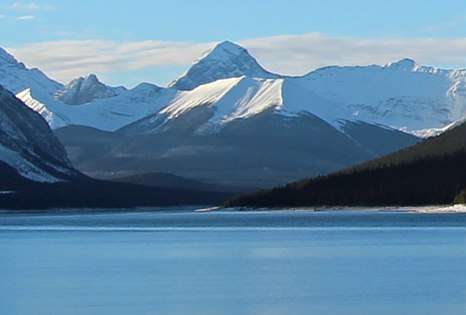 Mount Smuts seen from Spray Lake
Mount Smuts seen from Spray Lake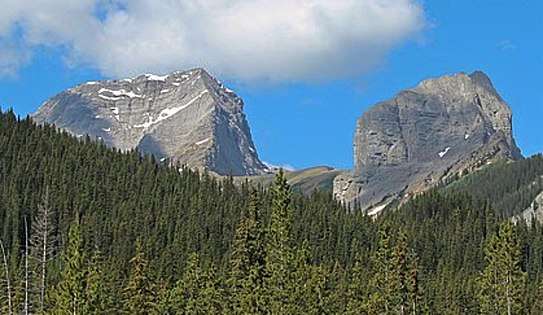 Mount Smuts (left) and The Fist seen from Smith-Dorrien Road
Mount Smuts (left) and The Fist seen from Smith-Dorrien Road
